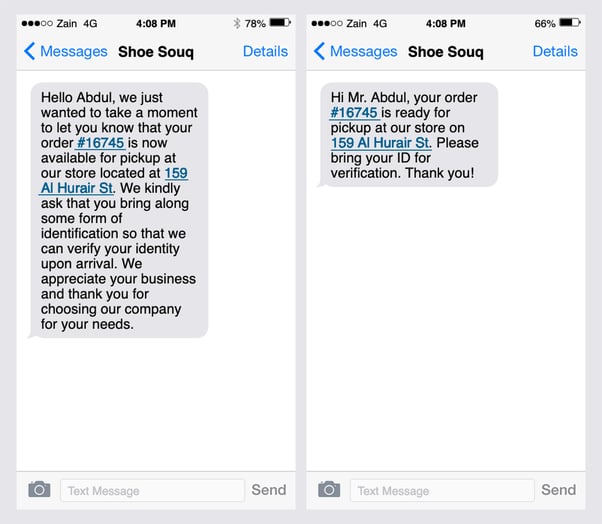Unlocking SMS marketing success in Saudi
Unlocking SMS marketing success in Saudi

SMS marketing has become an essential part of the marketing strategy for businesses in Saudi Arabia. With a population of nearly 36 million and a mobile penetration rate of 159.6%, the potential audience is huge. When you also factor in an open rate for SMS of 94% vs only 22% for email, and the fact that 67% of consumers in the kingdom have made a purchase after receiving an SMS marketing message, it's no surprise that SMS marketing is a popular choice for businesses in KSA.
.png?width=439&height=903&name=SMS%20GREEN%20-Unifonic%20infographic%20(1).png)
Read on to explore some key strategies, tips, and insights to unlock success with SMS marketing in Saudi Arabia.
Multi-Lingual Approach

Saudi Arabia is a diverse country with a population that speaks several languages. The main language of the kingdom is Arabic so any business hoping to gain traction with an SMS campaign needs to communicate in that language. However, the country also has millions of expatriates living and working there and speaking dozens of different languages, with English being a common language of business. So it’s fair to say that it's essential to consider the preferred language of your recipients when creating SMS campaigns. By using a multi-channel communication platform that integrates with your internal CRM via an SMS API, you can store your customers’ preferred language of communication along with other details such as their name and purchase history, and always make sure that you are talking with your customers in their preferred language. This increased level of personalization can lead to greater trust and rapport and more effective SMS campaigns.
Clear and Concise Language
When creating SMS campaigns, it's essential to use clear and concise language. SMS messages have a limited character count, and businesses must make every character count. Clear and concise messaging helps customers quickly understand the message and take appropriate action. To maximize the effectiveness of SMS marketing, it’s always advisable to avoid using too many technical terms, and language that may confuse or lose the attention of the recipient.

In the first example above there are a lot of words and the vital parts are not clear. The second example is short, easy to read, and contains only the information that the recipient needs to action.
Messaging Frequency
Messaging frequency is a crucial factor to consider when using SMS marketing. Sending too many messages to customers can lead to them ignoring your messages, opting out of the SMS service, or even worse, marking your messages as spam. A good practice for messaging frequency is to set clear expectations with customers on how frequently they will receive messages and a useful rule of thumb is to send no more than one message a day, and only if it’s relevant. Businesses should also take the time to determine the best time to send messages. For example, sending messages during non-business hours may lead to customers feeling annoyed or interrupting their downtime. It's crucial to strike a balance between frequency and relevancy to ensure customers remain engaged and interested.
Measuring SMS Marketing Success (and Acting on Insights)

To measure the success of SMS marketing campaigns, businesses must track metrics such as open rates, click-through rates, and conversion rates. Measuring these metrics can help businesses determine which campaigns are working and which ones need improvement. By measuring SMS marketing success, businesses can also make informed decisions on future campaigns and improve ROI. It’s only by first tracking, then analyzing, and crucially, acting upon the data by making changes that improvements can be made.
Legal Considerations for SMS Marketing in Saudi Arabia
In Saudi Arabia, there are regulatory considerations to take into account when using SMS marketing. The Communications and Information Technology Commission (CITC) regulates SMS marketing in terms of what kind of messages can be sent, when, and by whom. All businesses sending SMS messages in KSA must comply with the regulations to avoid penalties. Spamming is illegal in Saudi Arabia, and businesses must ensure they have the necessary permission before sending messages to customers. Additionally, businesses must respect the privacy of customers and ensure their data is secure. For a more detailed look at the regulations around sending SMS messages for businesses in Saudi Arabia, read our recent article on the subject.
Saudi Arabia is a country with a population of around 36 million people, many of whom are prolific users of SMS and have a proven willingness to engage and make purchases through the platform. For these reasons, it makes sense for businesses operating in the country to embrace SMS and find its full potential.
By using a multi-lingual approach to target customers using their preferred language, clear and concise massaging, and appropriate messaging frequency, businesses can create SMS campaigns that engage and convert customers.
Measuring success, complying with legal regulations, and modifying campaigns based on results are also crucial factors to consider when using SMS marketing. At Unifonic, we provide conversational multichannel marketing platforms that help businesses in Saudi Arabia leverage the power of SMS marketing. Contact us today to learn more about how we can help you unlock success with SMS marketing.
Related articles

19 January 2023
A Short Guide to the SMS Compliance Landscape in KSA
Read more



